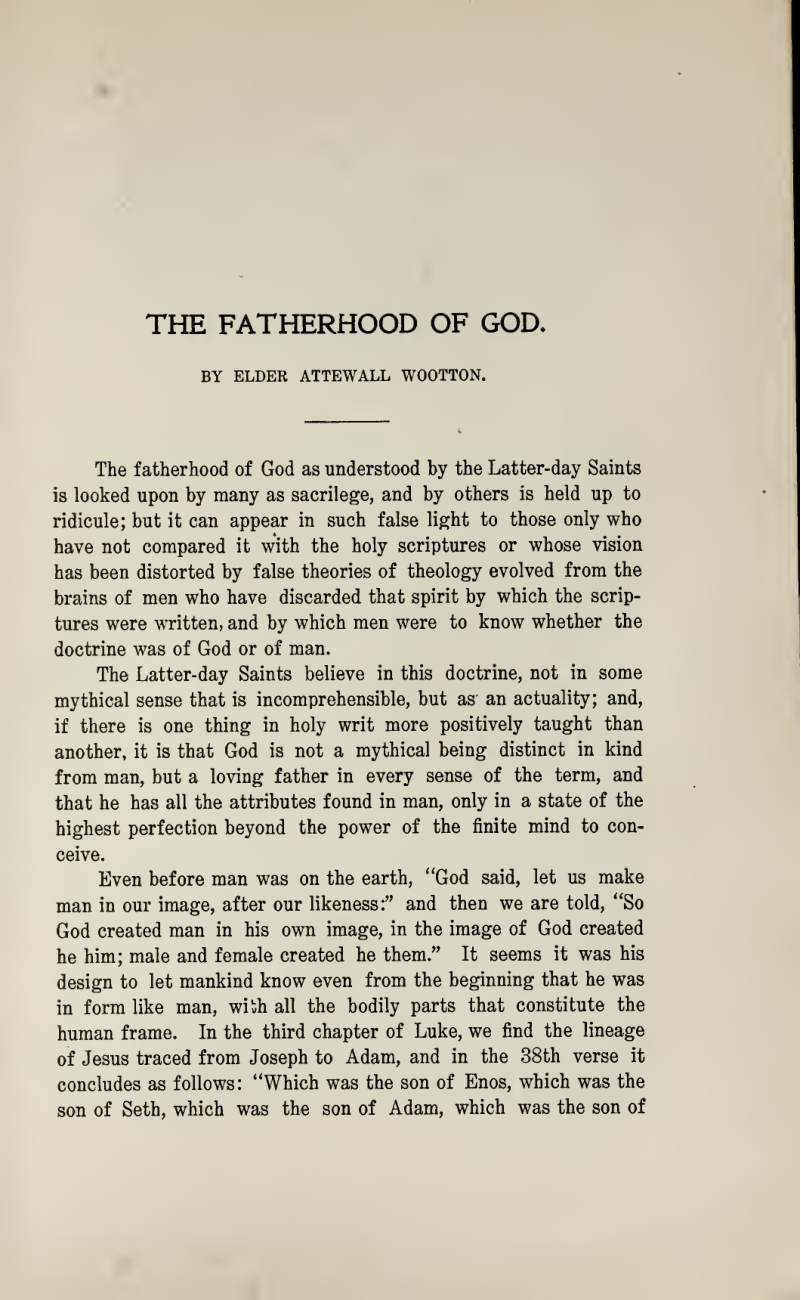Attewall Wootton writes that Adam is a literal, not figurative, Son of God and not the Father of our Spirits.
- Type
- Periodical
- Source
- Attewall Wootton LDS
- Hearsay
- Direct
- Reference
Attewall Wootton, "The Fatherhood of God," Improvement Era 3, no. 8 (June 1900): 595-97
- Scribe/Publisher
- Improvement Era
- Audience
- Reading Public, Members of The Church of Jesus Christ of Latter-day Saints
- Transcription
The fatherhood of God as understood by the Latter-day Saints is looked upon by many as sacrilege, and by others is held up to ridicule; but it can appear in such false light to those only who have not compared it with the holy scriptures or whose vision has been distorted by false theories of theology evolved from the brains of men who have discarded that spirit by which the scriptures were written, and by which men were to know whether the doctrine was of God or of man.
The Latter-day Saints believe in this doctrine, not in some mythical sense that is incomprehensible, but as an actuality; and, if there is one thing in holy writ more positively taught than another, it is that God is not a mythical being distinct in kind from man, but a loving father in every sense of the term, and that he has all the attributes found in man, only in a state of the highest perfection beyond the power of the finite mind to conceive.
Even before man was on the earth, “God said, let us make man in our image, after our likeness:” and then we are told, “So God created man in his own image, in the image of God created he him; male and female created he them.” It seems it was his design to let mankind know even from the beginning that he was in form like man, with all the bodily parts that constitute the human frame. In the third chapter of Luke, we find the lineage of Jesus traced from Joseph to Adam, and in the 38th verse it concludes as follows:
“Which was the son of Enos, which was he son of Seth, which was the son of Adam, which was the son of God.”
It is hardly to be supposed that this language is to be understood literally up to the last statement and that that should be figuratively. What object could there be in making the statement that Adam was the son of God if it were not in the same line of fatherhood as all the rest? There is no break in the statement to indicate that it should not be taken in the same literal sense as all the others? Paul, in Hebrews 12: 9, says:
“Furthermore we have had fathers of our flesh which corrected us, and we gave them reverence: shall we not much rather be in subjection unto the Father of spirits, and live?”
When Mary Magdalene went to the sepulchre and Jesus appeared to her, he sent a message to the disciples, which was eminently calculated to impress on their minds the fatherhood of God and the brotherhood of Christ; he said:
“Go to my brethren: and say unto them, I ascend unto my Father, and your Father, and to my God, and your God.”
We read in 1 John 3: 2:
“Beloved, now are we the sons of God, and it does not yet appear what we shall be, but we know that, when he shall appear, we shall be like him.”
The 8th chapter of Romans clearly indicates the fatherhood of God and the brotherhood of Christ. In the 29th verse Paul says:
“For whom he did foreknow, he also did predestinate to be conformed to the image of his Son, that he might be the first born among many brethren.”
We read in the same chapter, 16th and 17th verses:
“The spirit itself beareth witness with our spirit, that we are the children of God: and if children then heirs; heirs of God, and joint heirs with Christ; if so be that we suffer with him, that we may be also glorified together.”
Now, what is this heritage promised to the faithful? This is partly answered in Luke 12: 32; “For it is your Father’s good pleasure to give you the kingdom.” To Christ, “All power is given in heaven and on earth.” Then those who are to be joint heirs with him must inherit this power. The heirs of an estate inherit all that belongs to the father, so heirs of God must inherit all that he hath—all of Glory, of knowledge, of wisdom, of love, justice and mercy, and every perfected attribute of the Father, for Jesus said:
“Be ye perfect even as your Father in heaven is perfect.”
If this were impossible, it would be a very unjust commandment to His disciples. All these things can be inherited by countless millions without diminishing or exhausting the source, or without detracting from, but rather adding to, the glory and majesty of God, the Father; for it is like the lighting of one lamp from another in a room, there is no diminution of light in the first lamp, but each lamp that receives light in this way only increases the effulgence, until the whole room is brilliantly illuminated.
- Citations in Mormonr Qnas
The B. H. Roberts Foundation is not owned by, operated by, or affiliated with the Church of Jesus Christ of Latter-day Saints.

